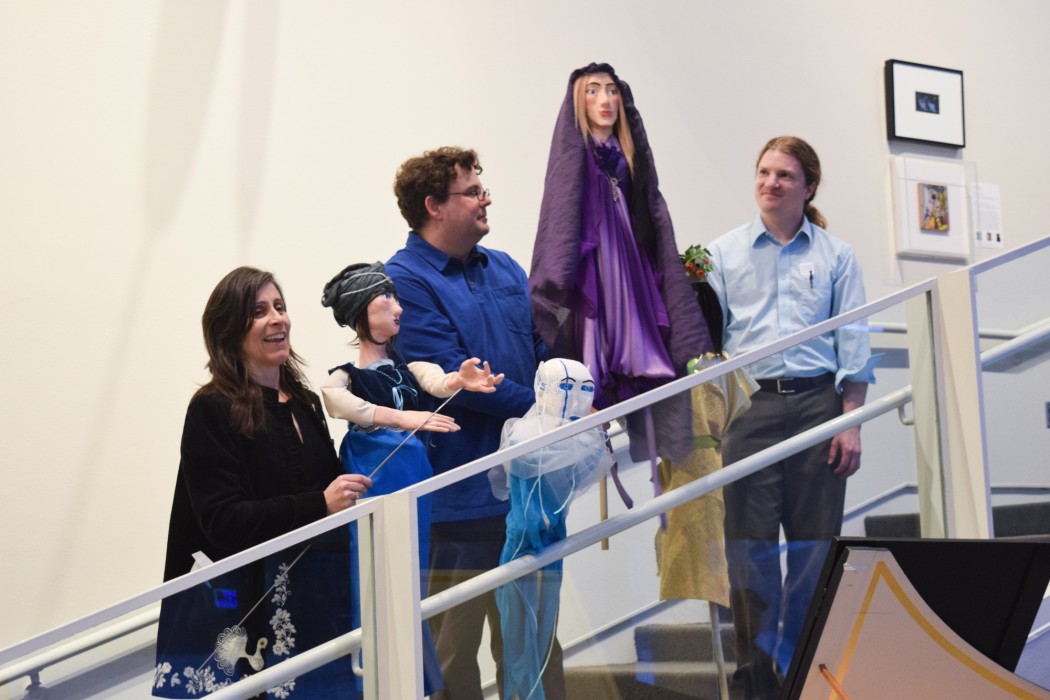Puppet opera brings arts college together
A young knight named Ruggerio is stranded on an island owned by Alcina, a sorceress who turns her former lovers into plants. His brother, Brodemonte, comes to the rescue.
On Friday and Saturday, the Caine College of the Arts will present its first-ever puppet opera, “La liberazione di Ruggiero dall’isola d’Alcina,” or, “The Rescue of Ruggiero from the Island of Alcina.” The opera, which will be held in the Morgan Theater, is a collaboration of all departments in the college.
The fine art students carved and will help control the puppets, the music students will play the live score, vocal performance students will sing the opera and theater performance majors will assist in puppetry.
Bringing the departments together for a show has been a unique experience, said Benjamin Krusch, a sophomore vocal performance major who sings the part of Ruggiero.
“In the Caine College of the Arts, unfortunately, there’s like a wall between the three disciplines. Between musicians, theater arts and visual arts,” Krusch said. “It’s been really interesting in this project to be able to break down those barriers and form working relationships and friendships with those other areas in the college.”
The opera is also unique because it was written by a woman, Francesca Caccini, which was especially uncommon in the 17th century, said Christopher Scheer, a music professor at Utah State and producer of the performance. He said it is among the first operas to be written by a woman.
Internationally-known scholar Suzanne Cusick, who studies gender as it relates to music history, will come from New York to lecture about the opera before each evening performance at 6 p.m., thanks to a grant from the Center for Women and Gender, Scheer said. All are welcome to attend.
Puppets weren’t part of Caccini’s original version of the play, but it was adapted for puppet performance 10 years ago by Dmitri Carter, a puppeteer from Seattle. Since then, many have performed the opera with puppets, Scheer said.
During spring break, a handful of students went to visit Carter in Seattle to learn more about the use of puppets in the show. Carter will oversee stage direction at this weekend’s performances.
Because the play was written in 1625, the music is different from modern music, which can be a challenge, said vocal performance senior Allysa Packard.
“It’s a very different style because it’s early opera,” she said. “In rehearsal we were reminded that the rhythm is so important, that we have to count. It’s written for the Italian we were singing. You have to remember you notes and things on top of that.”
Krusch said the harmonies can be perceived as “icky” when the listener isn’t used to them.
“It’s foreign in the fact that the harmony of what we’re used to when we think about listening to Mozart or Beehthoven is a lot different,” Krusch said. “This piece was written during a time before modern harmony had really been codified. A lot of the ways the notes are approached, are approached in a way that sounds icky to our ears.”
In addition to ancient harmonies, the opera will also feature some less-common instruments, such as the harpsichord and a lute-like instrument called a theorbo.
The performers, actors and artists have been working on the show for a year, Scheer said, so it’s amazing to see it finally come to the stage.
“The best part for me as the producer is seeing all the different elements that go into this show finally come together as a cohesive whole,” Scheer said.
Packard said the performance will be amazing experience for the audience because there are so many elements involved in the production.
“In many ways it’s a once-in-a-lifetime opportunity to see, and everyone should come,” she said.
The opera will be held Friday and Saturday at 7:30, plus an additional matinee on Saturday at 1:30. The performance is free and open to the public.
-melmo12@gmail.com

